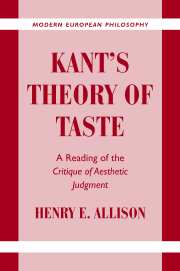Book contents
- Frontmatter
- Contents
- Acknowledgments
- Note on Sources and Key to Abbreviations and Translations
- Introduction
- PART I KANT'S CONCEPTION OF REFLECTIVE JUDGMENT
- PART II THE QUID FACTI AND THE QUID JURIS IN THE DOMAIN OF TASTE
- 3 The Analytic of the Beautiful and the Quid Facti: An Overview
- 4 The Disinterestedness of the Pure Judgment of Taste
- 5 Subjective Universality, the Universal Voice, and the Harmony of the Faculties
- 6 Beauty, Purposiveness, and Form
- 7 The Modality of Taste and the Sensus Communis
- 8 The Deduction of Pure Judgments of Taste
- PART III THE MORAL AND SYSTEMATIC SIGNIFICANCE OF TASTE
- PART IV PARERGA TO THE THEORY OF TASTE
- Notes
- Bibliography
- Index
8 - The Deduction of Pure Judgments of Taste
Published online by Cambridge University Press: 18 January 2010
- Frontmatter
- Contents
- Acknowledgments
- Note on Sources and Key to Abbreviations and Translations
- Introduction
- PART I KANT'S CONCEPTION OF REFLECTIVE JUDGMENT
- PART II THE QUID FACTI AND THE QUID JURIS IN THE DOMAIN OF TASTE
- 3 The Analytic of the Beautiful and the Quid Facti: An Overview
- 4 The Disinterestedness of the Pure Judgment of Taste
- 5 Subjective Universality, the Universal Voice, and the Harmony of the Faculties
- 6 Beauty, Purposiveness, and Form
- 7 The Modality of Taste and the Sensus Communis
- 8 The Deduction of Pure Judgments of Taste
- PART III THE MORAL AND SYSTEMATIC SIGNIFICANCE OF TASTE
- PART IV PARERGA TO THE THEORY OF TASTE
- Notes
- Bibliography
- Index
Summary
Having completed our analysis of the Analytic of the Beautiful, viewed as an effort to uncover the conditions under which a judgment of taste can be pure, we are now in a position to consider Kant's attempt to ground the normativity of such judgments. This is the task of the Deduction, which, as noted previously, deals with the quid juris, the question of right, just as the Analytic dealt with the quid facti, or question of fact.
Although the entirety of §30–§54, which includes Kant's discussion of fine art and genius, falls under the general heading “Deduction of Pure Aesthetic Judgments,” it is generally agreed that the actual deduction is contained in §30–§39, and these are the sections to be discussed in the present chapter. Basically, I shall argue that Kant succeeds in the relatively modest task that he sets for himself in these sections, namely, to ground the right to demand agreement regarding such judgments by showing that it is derived from a subjective principle of judgment that is itself transcendentally grounded. This result is relatively modest, since it applies only to pure judgments of taste, and since it turns out that we are never in a position to determine with certainty whether a given judgment of taste is pure.
The chapter is divided into seven parts. The first deals with the opening section (§30), where Kant limits the scope of the Deduction to judgments of natural beauty, explicitly excluding judgments of the sublime and (by implication) those of artistic beauty as well.
- Type
- Chapter
- Information
- Kant's Theory of TasteA Reading of the Critique of Aesthetic Judgment, pp. 160 - 192Publisher: Cambridge University PressPrint publication year: 2001



